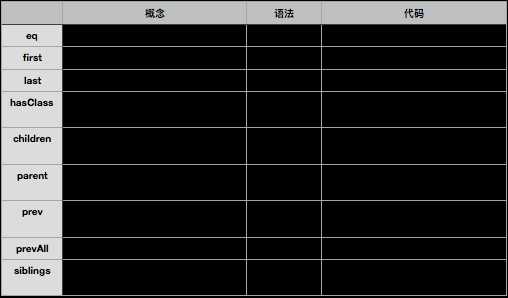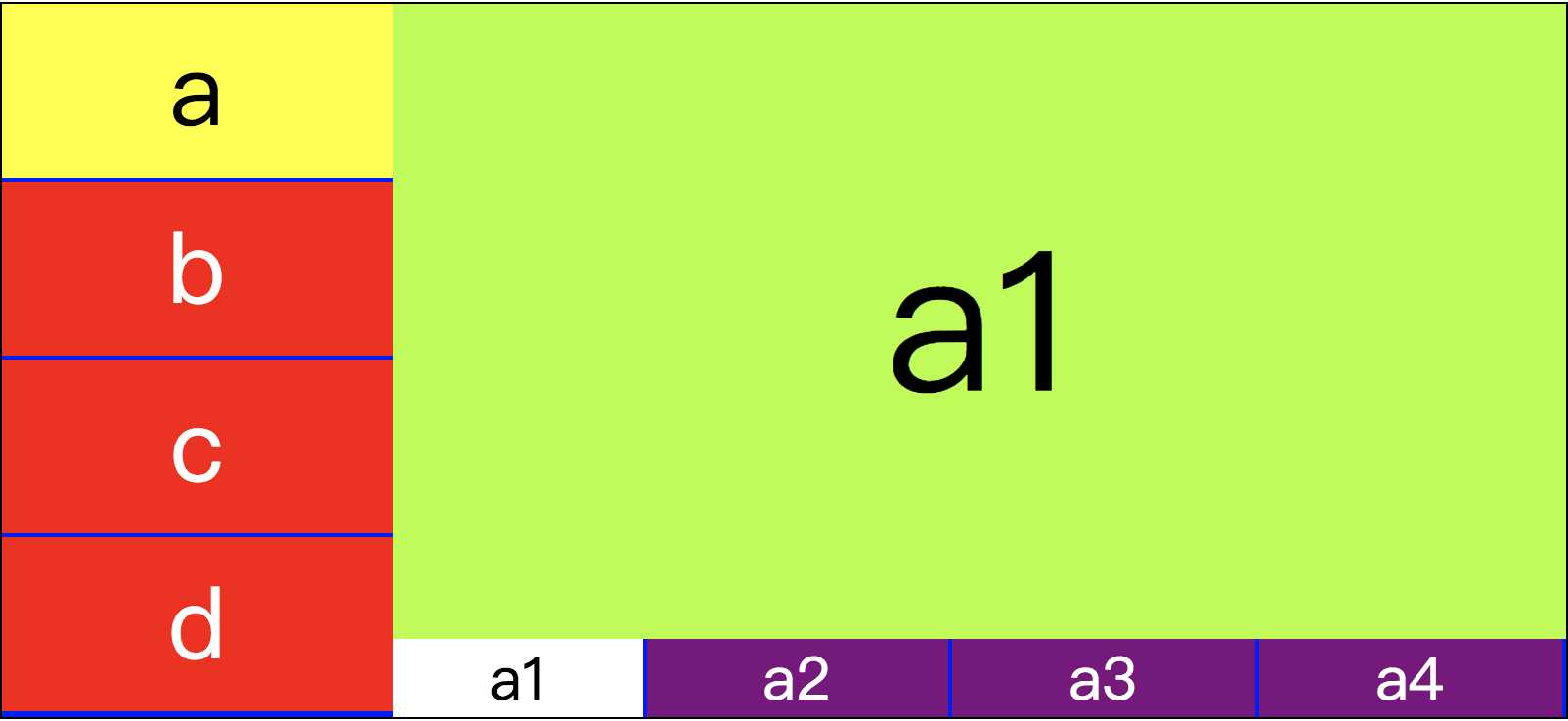jQuery三——筛选方法事件
Posted xiugeng
tags:
篇首语:本文由小常识网(cha138.com)小编为大家整理,主要介绍了jQuery三——筛选方法事件相关的知识,希望对你有一定的参考价值。
目录
| 一、jquery常用筛选方法 |
以下为jquery的常用筛选方法:

代码示例如下:
<!DOCTYPE html> <html lang="en"> <head> <meta charset="UTF-8"> <title>筛选方法</title> <style type="text/css"> li.active { font-size: 50px; } </style> </head> <body> <ul> <li class="danger">1</li> <li><a href="#">luffy</a></li> <li class="danger">3</li> <li>4</li> <a href="#"> 百度</a> <a href="#" id="anchor">百度</a> </ul> </body> <script src="jquery-3.3.1.js"></script> <script type="text/javascript"> $(function () { console.log($(‘li‘)); // 输出:jQuery.fn.init(4) 类似数组的索引 // jQuery的遍历方法:.each() // $(‘li‘).each(function (index,ele) { // 索引,对象 $(‘ul‘).children().each(function (index, ele) { console.log(ele); // <li class="danger">1</li> : js的dom对象 console.log(index); // 0 : index // 判断当前匹配元素里是否有这个类名 var isDanger = $(this).hasClass(‘danger‘); if (isDanger) { $(this).css(‘color‘,‘red‘); } else { $(this).css(‘font-size‘,‘20px‘); } }) // children() console.log($(‘ul‘).children()); console.log($(‘li‘)); // 同上 console.log($(‘ul‘).children(‘.danger‘)); // parent() console.log($(‘li‘).parent()); // jQuery.fn.init [ul, prevObject:... // last() 最后一个元素 prev:前一个元素 console.log($(‘li‘).last().prev()); // jQuery.fn.init [li.danger console.log($(‘li‘).last().prevAll()); // silbings:筛选给定的同胞同类元素(不包括给定元素本身) console.log($(‘li‘).siblings(‘li‘)); console.log($(‘#anchor‘).siblings(‘a‘)); // jQuery.fn.init [a, prevObject.. // 鼠标指向的li标签变大,移走后变小的选项卡效果 $(‘li‘).hover(function () { $(this).addClass(‘active‘).siblings(‘li‘).removeClass(‘active‘); }) }) </script> </html>
| 二、应用筛选方法实现选项卡 |
选项卡这种效果在网页中应用非常多,效果如下图所示:

示例代码如下所示:

<!DOCTYPE html> <html> <head> <meta charset="UTF-8"> <title></title> <style type="text/css"> *{padding: 0;margin: 0;} ul{ list-style: none; } /*清除浮动产生的问题 浮动产生的原因:父级元素没有填充高度以及填充的时候父级撑不开,导致子级元素浮动*/ #box:after{ /*伪类选择器*/ content: ""; display: block; clear: both; /* 盒子左右两边都不浮动 */ } #box{width: 800px;border: 1px solid black;margin: 20px auto;background: blue;} #leftBox{width: 200px;float: left;} #leftBox li{width: 200px;height: 89px;background: red;margin-bottom: 2px;color: white;font: 50px/89px "黑体"; text-align: center;} #rightBox div{display: none;float: left; width: 600px;} #rightBox p{width:100%;height: 325px;font: 100px/325px "黑体";text-align: center;background: greenyellow } /* font:100px/325px; 代表font-size:100px;line-height:325px; 垂直居中*/ /*text-align:center; 代表中心对齐*/ /*父元素设置display:table使它成为一个块级表格元素 * 子元素设置display:table-cell使子元素成为表格单元格,就好比是在表格中一样*/ #rightBox ul{width: 600px;display: table;} #rightBox li{display: table-cell;background: purple;height: 40px;border-right: 2px solid blue;font: 30px/40px "黑体";text-align: center;color: white;} #leftBox .active{background: yellow;color: black;} #rightBox .active{background: white;color: black;} </style> </head> <body> <div id="box"> <ul id="leftBox"> <li>a</li> <li>b</li> <li>c</li> <li>d</li> </ul> <div id="rightBox"> <div style="display: block"> <p>a1</p> <ul> <li class="active">a1</li> <li>a2</li> <li>a3</li> <li>a4</li> </ul> </div> <div> <p>b1</p> <ul> <li class="active">b1</li> <li>b2</li> <li>b3</li> <li>b4</li> </ul> </div> <div> <p>c1</p> <ul> <li class="active">c1</li> <li>c2</li> <li>c3</li> <li>c4</li> <li>c5</li> <li>c6</li> </ul> </div> <div> <p>d1</p> <ul> <li class="active">d1</li> <li>d2</li> <li>d3</li> <li>d4</li> </ul> </div> </div> </div> </body> <script src="jquery-3.3.1.js"></script> <script type="text/javascript"> $(function(){ //鼠标移入的时候 $(‘#leftBox li‘).mouseover(function(){ //修改自己的样式 siblings:选到本身以外其他兄弟元素,去除active类对应的样式 $(this).addClass(‘active‘).siblings(‘li‘).removeClass(‘active‘); //修改右边的div console.log($(this).index()); // 利用$(this).index()取当前对象的索引,输出:0123 // eq(index):获取第N个元素的筛选方法 showhide方法控制元素显示隐藏 $(‘#rightBox div‘).eq($(this).index()).show().siblings(‘div‘).hide(); }) $(‘#rightBox li‘).click(function(){ $(this).addClass(‘active‘).siblings(‘li‘).removeClass(‘active‘); var liValue = $(this).html(); // 得到对应<li>标签的值 // 找到li元素的父元素的前一个元素————<p> 给<p>设置html值 $(this).parent().prev().html(liValue); }) }) </script> </html>
1、使用:after伪元素解决经典清除浮动的问题
浮动产生的原因:父级元素没有填充高度以及填充的时候父级撑不开,导致子级元素浮动
#box:after{ /*伪类选择器*/
content: "";
display: block;
clear: both; /* 盒子左右两边都不浮动 */
}
2、注意font:100px/325px; 这种特殊写法
#rightBox p{width:100%;height: 325px;font: 100px/325px "黑体";text-align: center;background: greenyellow }
/* font:100px/325px;代表 font-size:100px; line-height:325px; 垂直居中*/
/*text-align:center; 代表中心对齐*/
3、display: table; 和 display: table-cell;
/*父元素设置display:table使它成为一个块级表格元素
* 子元素设置display:table-cell使子元素成为表格单元格,就好比是在表格中一样*/
#rightBox ul{width: 600px;display: table;}
#rightBox li{display: table-cell;background: purple;height: 40px;border-right: 2px solid blue;font: 30px/40px "黑体";text-align: center;color: white;}
4、$(this).index()可以得到当前对象的索引。两边的元素可以通过索引和eq()方法进行联动:
// eq(index):获取第N个元素的筛选方法 showhide方法控制元素显示隐藏 $(‘#rightBox div‘).eq($(this).index()).show().siblings(‘div‘).hide();
5、选项卡实现原理:监听鼠标移入事件,触发事件后选到当前被移入的元素,用addClass添加类以此来添加样式,再用siblings选到其他兄弟元素,去除类以此来去除样式。
$(function(){
//鼠标移入的时候
$(‘#leftBox li‘).mouseover(function(){
//修改自己的样式 siblings:选到本身以外其他兄弟元素,去除active类对应的样式
$(this).addClass(‘active‘).siblings(‘li‘).removeClass(‘active‘);
//修改右边的div
console.log($(this).index()); // 利用$(this).index()取当前对象的索引,输出:0123
// eq(index):获取第N个元素的筛选方法 showhide方法控制元素显示隐藏
$(‘#rightBox div‘).eq($(this).index()).show().siblings(‘div‘).hide();
})
$(‘#rightBox li‘).click(function(){
$(this).addClass(‘active‘).siblings(‘li‘).removeClass(‘active‘);
var liValue = $(this).html(); // 得到对应<li>标签的值
// 找到li元素的父元素的前一个元素————<p> 给<p>设置html值
$(this).parent().prev().html(liValue);
})
})
6、类似的点击右下方按钮,切换显示内容。是通过parent()方法找到当前元素的父级元素ul,再通过prev()方法定位到元素p,再通过html()方法赋值,修改显示内容。
var liValue = $(this).html(); // 得到对应<li>标签的值 // 找到li元素的父元素的前一个元素————<p> 给<p>设置html值 $(this).parent().prev().html(liValue);
以上是关于jQuery三——筛选方法事件的主要内容,如果未能解决你的问题,请参考以下文章
